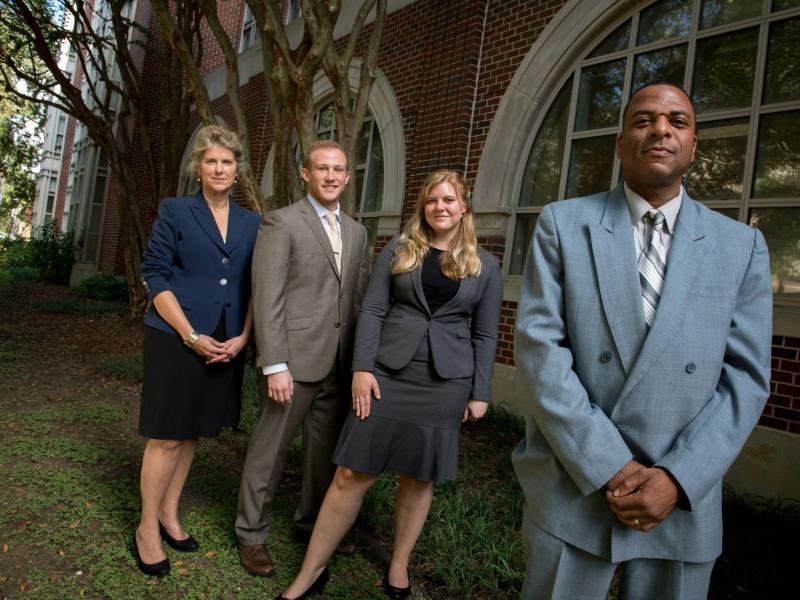'We're not giving up': Tulane Law clinic frees man from life sentence
It took 11 years and 22 student attorneys from Tulane’s Criminal Justice Clinic to help free Michael Monroe.
Last week, after serving 21 years of a mandatory life sentence in Louisiana’s State Penitentiary at Angola, Monroe’s legal saga ended; he was re-sentenced to eight years with credit for time served. At his hearing were his last two Tulane clinic student-attorneys, and the woman who shepherded the case for more than a decade, Clinic Director Prof. Katherine Mattes.
“I cannot thank them enough; Miss Mattes, the students, Tulane,” said Monroe. “Knowing that I had someone on my side, it gave me hope and a goal to reach.”
Monroe, convicted in 1998 as a habitual offender for breaking in to a closed French Quarter restaurant, was sentenced under the state’s tough ‘three strikes’ laws, where judges at the time were hamstrung to give mandatory life sentences even in victimless, non-violent cases.
And that’s why Mattes wouldn't give up on Monroe.
“He didn’t deserve to be in prison for life,” she said.
“Throughout his ordeal, even when things weren’t looking good, such as after we lost an argument in court, he worked hard and never blamed us. He always kept our spirits up, too.”
Monroe’s case was a striking example of how overwhelmed and underfunded the Orleans Parish Public Defenders’ Office was at the time of Monroe’s conviction, and ultimately, how damaging the three strikes laws were to those accused of petty crimes.
Years later, after Hurricane Katrina, his own court-appointed attorney testified citing Monroe’s case as one of those where he had not had enough time to properly prepare and advise his client; Monroe did not know that his simple burglary charge could lead to a life sentence. After reading in the local newspaper his lawyer’s acknowledgment that he had been ineffective in his representation, Monroe wrote the judge.
The trial judge appointed Mattes and the clinic to take the case. It was an almost insurmountable task to find justice for Monroe. Initially, the clinic sought a reduced sentence saying Monroe was a model prisoner, and would be a contributing member of society. While in prison, he worked in Angola’s hospice, in the infirmary and eventually was a driver to a warden.
“We saw in motion after motion that the law was not on our side,” Mattes recalled, pointing to cabinets in the Tulane clinic full of legal documents in the case. “So when our final legal option failed, I remember telling the students, ‘We’re not giving up. Let’s work to change the law.’ ”
By this time, the state’s three strikes laws had been updated to exclude offenders like Monroe, with minor crimes on their records. But, for some time, the law was not retroactive.
In 2016, two Tulane students helped draft a bill (Act 469) that would allow inmates like Monroe to seek parole. Mattes and her students, 2016 law graduates Sara Norval and Tobias Hasler, persuaded State Sen. Danny Martiny to sponsor the bill; they went to Baton Rouge to testify and advocate the bill’s passage.
They were successful, and that year Act 469 became law. Monroe would get parole with the help of two more clinic students, Cody Seto and Kelsey Tebo, both 2017 graduates, but it was not the same as being free.
“Parole hinders you, too,” he said. “You can’t travel or work far away, or get credit. You’re free, but limited.”
That’s when his final clinic student attorneys,Tanner Beal and Laura Frost, both current third-year students, took on the case. They had to show Monroe was a good candidate for re-sentencing under new laws, and that he had reformed his life.
“Although we felt confident we would be successful,” Beal said. “We had to make a very strong case so that he would receive a lower sentence (and credit for his 21 years served). It was not guaranteed.”
For Beal and Frost, the case was first-hand experience with a real person who needs legal help, and what they have gone through in the system. It taught them how to advocate for a client.
"Working on Mr. Monroe's case as his last student attorneys and our first case in clinic was the greatest way to start the year. He is an incredible man - so full of hope and perseverance - and I am so excited to see justice finally served,” Frost said.
“As an aspiring public defender, being able to close the book on an 11-year endeavor for the clinic has furthered my commitment to indigent defense and advocating for the dignity of system-involved individuals,” Beal said.
Over the course of the case, Monroe influenced a few law careers, too.
Kristin Wenstrom (L’08) was one of Monroe’s first student attorneys through Tulane’s clinic. She filed his first application for post-conviction relief.
“His case is really emblematic of how cruel the sentencing laws were; they would take a good person who could have been contributing to the community and put him away to be forgotten,” Wenstrom said. “He did not need to be in jail.”
His case was a significant influence for her: Wenstrom is a senior attorney for the Campaign to End Extreme Sentencing for Youth, Louisiana Center for Children’s Rights.
“I started out doing post-conviction relief work in that case, and here I am, 10 years later, representing people in post-conviction relief,” Wenstrom said.
As for Monroe, he recently visited Tulane Law and watched Mattes wipe his name off her dry-erase board, an imposing element in her office where she tracks student cases.
“Finally, thank God,” he said to much laughter in the room, surrounded by the students and the professor he now considers family.

